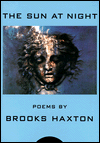我兄弟奥西里斯的尸体在芥菜籽里(外二首)
◎钼
那年,去切尔诺贝利之前,每天晚上我都在
整理翻译报告
在苏维埃核能工厂工程师的帮助下。
许多次我打到钼这个字,
不能确定如何表达它。
三美元一条,八条一小时,
参阅权威译本,
还是感到不妥,我想删除
一个短语但可能会制造危险的
毫无价值的误传。
这是我们有第一个孩子的那年,当时我有
四份工作,每天起早贪黑地写作
钟点祈祷和老子的
挂像,原始的念头,那报告
所有的事都含糊不清地崩向我。
那之后的一年,在一本杂志上,我看到
那些被辐射的婴孩,产死的,在痛苦中,
微黄色的火山灰毒毁
一个年青男子的前臂,
他死了,标题说,在七个月内。
尽管如此,我还是企望让我的部分身体保持知觉,
那种方式,为延缓职位而保住他们工作的人们使用的:
一个把钚扭结成一个桶
用他赤裸的双手;而另外一个
写下这些关于它却无人阅读的文字。
老聃 译
注解:
钼(molybdenum) 一种银白色硬金属元素,用于加硬钢合金和软化钨合金。它是植物营养必要的一种微量元素,用于肥料、染料、搪瓷和试剂。
切尔诺贝利(Chernobyl) 1986年4月16日的一场核能大事故的所在地,前苏联欧洲部分中西部城市,位于基辅西北偏北,当时人口12,000。
祈祷(hour)天主教的定时祈祷, 祈祷文。
钚(plutonium)一种天然地放射性银色超铀金属元素,存在于铀矿中,对铀元素进行中子轰击而人工制成。其存在周期最长的同位素是半衰期为七千六百万年的钸244,它是一种核辐射毒素,特别是能被骨髓吸收。尤其是其极具可裂变性的同位素钸239,被用作一种核反应燃料并用在核武器中。
MOLYBDENUM
by Brooks Haxton
The year before Chernobyl I spent evenings
abstracting translations of reports
by engineers on Soviet nuclear-power plants.
Many times I typed the word molybdenum,
uncertain how it might be said.
Three dollars an item, eight items an hour,
faking the Authoritative Version,
I felt queasy, that a phrase deleted
might make dangerous misinformation
of the nonsense in my head.
This was the year of our first baby, when I worked
four jobs, and wrote before dawn every day
devotions on the hours and pastiches
of Lao-tzu, the sense of the originals
as vague to me as anything in the reports.
That next year, in a magazine, I saw
the radiation babies, stillborn, and in pain,
and yellowish eruptions on the forearm
of a young man poisoned cleaning up.
He died, the caption said, in seven months.
And still, I want to make my part make sense,
the way men stay at work to keep their jobs:
one wrings plutonium into a bucket
with his bare hands; and another
writes about it for no one to read.
◎我兄弟奥西里斯的尸体在芥菜籽里
种子来源于一个早先的埃及坟墓,
大水过后损坏了
赫斯德丽斯博物馆的容器,
一九五五年发芽。
这一年我兄弟
滑到在潮湿的原木上。
他被冲进了
回水,眨眼工夫就不见了。
下游
他的后脑勺
发现,正好
在一道狭窄的瀑布。
在这糟糕的石头之间
我兄弟的后脑勺
显得潮湿,窄小,模糊。
我注视着它,一边狂啸。
一边噙着泪水,恐惧地
祈祷,我告诉主
他正在游水。请等一等。
他还会举起他的脸来的!
老聃 译
注解:
奥西里斯(OSIRIS),埃及神话中地狱判官,埃及诸王之父, 在绘画中表现为手持节杖和鞭坐在王位上。其一年一次的死亡与复生人格化了大自然自我更新的生命力和多产的特点。这首诗里的种子和我的兄弟的死其之所以发生关联也是建立在这一基础上的,非常巧妙。这首诗,使人容易联想到哈克斯顿翻译的古希腊短歌中的《卡龙》(charon)。
THE BODY OF MY BROTHER OSIRIS IS IN THE MUSTARD SEED
by Brooks Haxton
Seed from an early Egyptian tomb,
after water damage to the case
in the Historisches Museum,
sprouted in 1955.
That was the year my brother's foot
slipped on spray-wet log.
He was gone
into the whitewater out of sight.
Just downstream
the back of his head
came up
in a narrow chute.
Between terrible rocks
the back of my brother's head
looked wet and small and dark.
I watched it through the roar.
Through tears, afraid
to pray, I told God
he was swimming. Wait.
He would lift his face.
◎匿名地服从
众目睽睽的颂经台,摇动的颂经台,搜索
灵魂的面孔,至诚的标记
留心工作,我想,当我流泪朗读
我写下的话:如果我早就明白
我父亲的买卖,我会卖给人们衣服,
而不是眼泪。我会
下跪,祝贺典范的狗吠
喃喃自语,带着细微地挤压
在我的嘴唇之间。那就是我在嘲笑轻蔑中
度过年轻时候的生活,因为我认为生活
如果没有消遣,就利用语言。然而,现在
观察陌生人房间的眼睛,我想
他们会感觉到我说的联系的含义,很易觉察
当一个袖子下垂到他的手腕,身着加厚
精纺毛衣的男子出现,那儿就会有一阵骚动
在感恩地欢呼和怜悯里:
他们可以走了。一个少年,局促不安
他自己和我,我笨拙地
搅着手指头,说了声谢谢。
老聃 译
Anonymous submission.
By Brooks Haxton
Gripping the lectern, rocking it, searching
the faces for the souls, for signs of heartfelt
mindfulness at work, I thought, as I recited
words I wrote in tears: instead of tears,
if I had understood my father's business,
I could be selling men's clothes. I could be
kneeling, complimenting someone at the bay
of mirrors, mumblingly, with pinpoints pressed
between my lips. That was the life I held
in scorn while young, because I thought to live
without distraction, using words. Yet, looking
now into the room of strangers' eyes, I wanted
them to feel what I said touch, as palpably
as when a man in double worsted felt
the cuff drop to his wrist. There was a rush
in the applause of gratitude and mercy:
they could go. A teenager, embarrassed
for himself and me, lefthandedly
squeezed my fingers, and said thanks.
(小说)野 鹅
老聃 译
黎明的时候,在我的窗下,我看到一个在雪地上走动的人(我想是居民)。那是一个步伐坚硬的声音,像使你们前进的氯丙嗪。他穿了一件深色衣服,没有外套。顺着小路,野鹅把它们的喙插入雪中吃草。它们没有留意他。一阵浅雾令眼前的一切变得暖和而宁静,但排水池旁边的旧焚尸房已经结冰,那是犹太人赎罪的地方,他们把面包扔进流动的水面。过了一会儿,接线总机员按铃叫我:那有一位客人。他在休息室等着我。是的,(她叫我亲爱的)她的确试图告诉他路,但他是个聋子,或者是操另外一种语言的人……希腊语,谁知道。他有一个纸板小片,上面用彩色蜡笔潦草地写着我的名字,她说,必定是一个骗局,一个神精病。我猜到他是从哪来的了,但我没有告诉她,至少那是谁的文字。我谢谢她。我和他爬上旅行轿车,他死一般地安静,我也安静,但他不出气。到家了我去停车,我说,“你必须去试试开门。我在楼上工作。那边的房间听不到门铃的。”我走进雪和薄雾,站在那里看着那些树,院子里的大云杉,白松,雪松的枝芽堆着积雪,弯了下来。我想,为什么不。我找来一个旧面包袋,拉着他去池塘边,示范给他看,如何把面包屑撒到冰上。他不以为然。他把他的喂给了野鹅,然后离开,留下我在那独自忏悔。我试着跟随泄洪道的流水奔跑,但糟糕的是,我从口袋里掏出纸板小片要看,它跌到了水里,从柳树上融化的水滴掉进死水沟,滴答在纸板上,纸板旋转着。我必定曾潦草地写下过自己的名字像纸板小片上的那样,用红色的蜡笔,在很久很久以前。
摘自《精神病院门房的雅典人》
注解:geese雌鹅,鹅肉,又是对犹太人的贬称,或者傻瓜。在文中跟Jews(犹太人)一词,有对应关系。氯丙嗪(Thorazine)盐酸氯丙嗪氯丙嗪的商标。
From The Attic Of The Insane Asylum Gatehouse
I caught a glimpse at dawn of someone (I thought inmate) walking under my window between banks of snow. There was a stiffness in his walk, like what you get on Thorazine. He wore a dark suit with no overcoat. Along the road wild geese pushed their bills into the snow to graze. They didn't notice him. A mist made everything look warm and quiet, but the drainage pond beside the old incinerator house was frozen, where the Jews come for atonement, to throw bread into the moving waters. After a while, the switchboard operator rang me: there's a guest. He's waiting for me in the lobby. Yes, (she called me dear) she did try telling him the way, but he was deaf, or spoke some other language ... Greek, who knows. He had a scrap of cardboard with my name in crayon scrawled, she said, by must-a-been a kid, a mental case. I didn't tell her where I thought he came from, much less whose handwriting it was. I thanked her. He and I climbed into the stationwagon, him dead quiet. I was quiet too, but he didn't breathe. At home I parked. I said, "You must have tried the door. I work upstairs. The doorbell doesn't reach those rooms." We stepped out into the snow and mist, and stood there looking at the trees, big spruces in the yard, white pines, cedar branches stooped with snow. I thought, why not. I fetched a bag of stale bread, took him to the pond, and showed him how to throw crumbs onto the ice. He didn't care. He fed his to the geese and walked off, which left me to work out the atonement.I tried again with running water at the spillway, but no luck. I tried the scrap of cardboard from my pocket, dropped it in. Drips melted from the willows into the ditchwater, hitting the cardboard as it spun away. I must have scrawled my name like that, in red crayon, a long long time ago.


 网站首页→流放地论坛→译文交流→我兄弟奥西里斯的尸体在芥菜籽里(外二首)
网站首页→流放地论坛→译文交流→我兄弟奥西里斯的尸体在芥菜籽里(外二首)


 网站首页→流放地论坛→译文交流→我兄弟奥西里斯的尸体在芥菜籽里(外二首)
网站首页→流放地论坛→译文交流→我兄弟奥西里斯的尸体在芥菜籽里(外二首)
